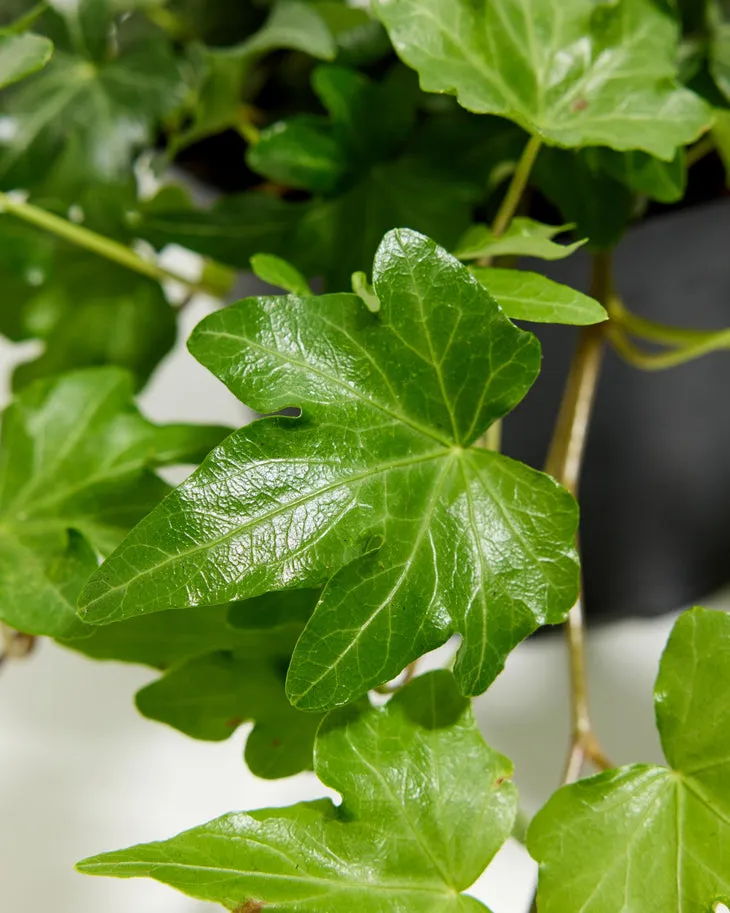English Ivy Care
Ivy plants are lush, long-vining plants that will look stunning in your home. They are fast-growing, evergreen plants that are happy to climb their surroundings or drape down the side of a hanging pot.

How to care for your English Ivy
- LIGHT
English ivy plants prefer bright indirect light but no direct sun as the foliage will burn. In less light, the ivy will become leggy and sparse.
- WATER
Let the top 25-50% of the soil dry out before watering. Allow the water to flow freely from the drainage holes on the bottom of the pot. Always empty the saucer of any water. English ivy does not like its roots constantly wet. Crispy brown leaves indicate over-watering, not under-watering.
- HUMIDITY
This plant loves to be misted with room-temperature water; feel free to do this daily, especially in the winter when the air is very dry. Not only does misting provide humidity it also keeps the pests away.
- TEMPERATURE
English ivy plants can grow in temperatures between 45-80°F; they prefer a consistent temperature rather than large swings in temperature.
- FOOD
English ivy thrives when fed two times per month in the spring and summer with a general-purpose indoor plant fertilizer at half-strength. There’s no need to feed in the fall or winter when the plant goes into a natural resting period; fertilizing during this time could do more harm than good.
- TOXICITY
English ivy is mildly toxic to humans and pets. Typically, ingestion will cause mouth and stomach irritation and possible vomiting.
- ADDITIONAL CARE
Feel free to trim up your English ivy regularly to keep it in shape. Snip off trailing vines that are just too long with a pair of sharp scissors or pruning shears to keep your plant looking full. You’ll get a bushier plant this way. You can prune (cut) your plant back by as much as half at a time — you won’t hurt this robust plant at all.
Common Issues for your English Ivy
Watering
Browning leaves can happen from both over- and under-watering your ivy. Be sure to let the soil dry out 25-50% of the way down before watering your plant. In the winter, you can err on the dry side. Always be sure to test the soil before you water.
When you water, make sure you provide enough water so that liquid soaks into the soil and flows from the drainage hole at the bottom of the pot and into the saucer. It’s extremely important to discard any excess water in the saucer, to avoid root rot.
Humidity
Your ivy thrives in a humid environment! Browning leaves can be a sign that the humidity is too low. Boost the humidity in your home by adding a humidifier nearby, creating a pebble tray, or misting the plant often.
Lighting
Brown crispy leaves can be a sign your ivy is getting too much light. Ivy plants prefer indirect bright light from an east-facing window, or a few feet back from a south- or west-facing window. If placed in too much direct sunlight, your ivy leaves will burn.
Overwatering
Overwatering your ivy can lead to yellowing leaves. Be sure to let the soil dry out 25-50% of the way down before watering your plant. In the winter, you can err on the dry side. Always be sure to check the soil before you water.
When you water, make sure you provide enough water so that liquid soaks into the soil and flows from the drainage hole at the bottom of the pot and into the saucer. It’s extremely important to discard any excess water in the saucer to avoid root rot.
Pests
Pests like spider mites, scale, and mealybugs can start to suck the nutrients from your plant, leading to discolored, yellowing leaves. It’s best to watch out for these pests regularly, looking for fine webbing and sticky substances on the plant. Treat immediately if you see signs of pests.
Normal Yellowing
Sometimes, yellowing is normal! If your plant is otherwise healthy and growing, it is likely that the older leaves are yellowing as part of the plant’s natural growth cycle. Your ivy will recycle the energy from older leaves to aid in new growth. You can trim these yellow leaves off once they are 75% discolored.
